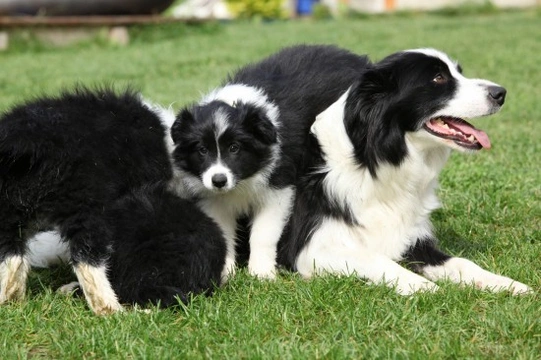
The different stages of a puppy’s imprinting process
Imprinting is the name given to the process of learning about a wide range of different environments, stimulus, people and other animals, and involves developing a familiarity with an animal, event or place, generating a propensity to know what to expect from it. It is in some cases related to bonding; for instance, the young puppy learns by imprinting that their dam takes care of them, feeds them and protects them, and this bond between them means that the puppies imprint on the dam, holding positive associations with her.
There are many different stages of imprinting within the life of the dog, and particularly in the case of puppies, who will begin to experience the world and everything in it over a very short period of time.
Read on to learn more about the imprinting process, and the different stages that puppies go through with it.
Early days with the dam
During the first three weeks of life while the puppies are totally helpless and their lives consist of a very narrow range of experiences all related to getting their needs met, the main endeavour of the puppies lives involve suckling, toileting, staying warm and safe and very little else.
However, once their eyes start to open at two to three weeks of age, their emotional development takes a big leap forwards, and the first thing that the puppies see and process is their dam. They then come to associate the dam with the food, care and warmth that they receive, and imprint upon her. They will be able to recognise her and seek her out, and identify her as unique from any other dogs that are present.
Imprinting on littermates
Between three and seven weeks of age, the puppies will become consciously aware of their littermates, and their relationship to them. They will begin to realise that their dam is also responsible for the other members of the litter, and that they are not the only dog in the world!
They will begin to play and learn from each other, understand the basics of being part of a pack with an alpha (the dam) and the pack mentality, and learn both the benefits and disadvantages of the presence of the other puppies. They will be able to recognise all of their own littermates, imprint on them as part of the family group, and find comfort in their presence.
Imprinting on other dogs and animals
If there are other dogs present within the household, the puppies will also begin to imprint on them during the three to seven week old stage, and begin to learn to differentiate between their immediate related family, other dogs in the household pack, and dogs that are not part of these extended groupings.
The process of imprinting on other non-related dogs is something that continues and occurs again and again throughout the life of the dog, as they join a family with another dog, see the same dogs regularly when out and about, and gain familiarity with other animals.
Imprinting can also occur between the puppy or dog and other animals, such as cats that share their household. Dogs can differentiate the family cat or cats from other cats that they spot out and about, and while they will have learnt through training not to chase the cats in the family that they have imprinted upon, they might not naturally follow this rule with strange cats outside of the home!
Imprinting on people
While puppies within the litter will be able to recognise human family members before they reach seven weeks of age, because their lives are so consumed with learning about their life and their canine family during this time, they will not imprint of humans at this young age.
From seven to twelve weeks of age, puppies will begin to make their very first human bonds, imprinting upon the caregiver of the household, and the family members that see them and play with them regularly.
This process of course continues when the puppies go to their new homes, as they then imprint on their whole new human family.
Imprinting and negative events
As well as imprinting on people and animals, events and learned experiences make their mark on the puppy as well. This learning process is how puppies learn not to pounce on the cat or they will get scratched, and not to sit too close to the fire, or they will get burned! These learning processes are important, and imprinted knowledge of this type is what helps to keep the puppy safe and well.
However, fear imprinting can also occur when a puppy experiences a negative event while young, and it is one of their first experiences of the person or event. Experiences during weeks eight to twelve of the puppy’s life will remain in their memory for life, and if your puppy has a negative experience during this time, it can be incredibly hard to get them to re-imprint later on with a positive association with the same stimulus.
For instance, if the first children that a puppy meets scares them or pulls them around, they are likely to be incredibly wary or scared of children as a result, something that can be hard to change. The same is true of events and situations, so it is important to make sure that all of your puppy’s “firsts” are positive for them, such as their first trip in the car, first trip to the vet, and the first time that they go outside.



